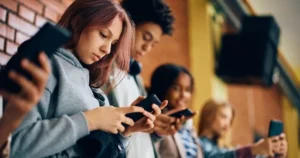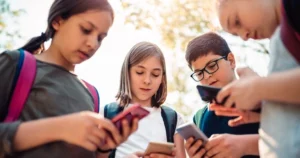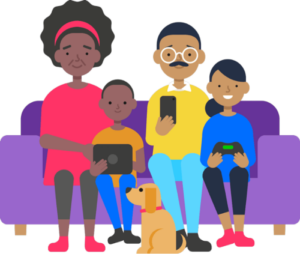In this blog we share the findings from Round 1 panels on the quality of education around nude-sharing that children are currently receiving.
Next week, we will share children’s views on how to improve prevention messaging.
The current landscape of Relationships, Sex and Health Education (RSHE)
Internet Matters has joined forces with Nominet, the public benefit internet company, and Praesidio Safeguarding to explore how to combat the growing issue of self-generated child sexual abuse material (CSAM) online.
Mandatory Relationships, Sex and Health Education (RSHE) was introduced in England and Wales in 2020. The curriculum aims to children to manage their personal lives in a safe and positive way, including in digital environments. The statutory guidance mandates that schools cover the legal implications of youth-produced sexual imagery, alongside knowledge of what constitute healthy and safe sexual relationships.
While the intentions of RSHE teaching on respectful relationships are the right ones, and curriculum guidance – for the most part – is constructive, we find that in practice, RSHE lessons are not meeting children’s needs.
How current RSHE lessons neglect children’s needs
One of the clearest and most consistent messages to arise through our Round 1 panels is the extent to which RSHE lessons are not meeting children’s needs, particularly around sensitive subjects. In one setting, children described RSHE as a ‘sideshow’ and a ‘free lesson basically’.
- Children describe RSHE as lacking detail and not offering enough information or advice – especially about sensitive subjects. Few pupils we spoke to had received specific lessons on sending nudes.
- When offered information on these topics, teachers are often non-subject specialists who are seen as wanting to speed through the topic because they find it ‘awkward’.
- The usefulness of RSHE is also seen as largely age dependent. Children see nude-sharing as a ‘serious’ and ‘potentially dangerous’ issue that should be addressed at a young age before it happens. Many children think that this should be at primary school or at the beginning of Year 7.Children in Years 7-9 see these lessons as useful and important, whereas Year 10 children feel that prevention messaging is too late – as by the time they reach this age, image-sharing will be commonplace, and norms entrenched.
There are issues in class size and mixed-gendered groups
In many settings, sensitive lessons about nude-sharing are conducted in mixed-gender and large classes, comprising up to 30 pupils.
- Children told us that it is difficult to share experiences or to ask questions in large classes of up to 30 pupils. They don’t feel supported or safe in doing so.
- Girls, in particular, find it hard to share and discuss issues around nude-sharing in front of boys for fear of being teased or bullied.
- Boys feel that there is a lack of seriousness around RSHE which can lead to a breakdown in behaviour and control. Breakdown in boys’ behaviour was cited as a key barrier for girls feeling comfortable to engage and develop prevention strategies.
- Some pupils identified that they were taught RSHE in form groups that they do not know as well as their learning groups, and this increased the discomfort and awkwardness.
What do students want in their RSHE lessons?
Young people were clear and unequivocal about how they would like RSHE to be delivered.
- Discussion: Sensitive subjects should be delivered in a discussion-based format, with opportunity to share experiences and ask questions. Learning ‘by PowerPoint’ isn’t viable in this context.
- Class size and gender: Sensitive topics – particularly those which relate to sexual harassment – should be also delivered in single-gender sessions, within smaller class groups of up to 10 pupils.
- Specialist teachers: Boys spoke about their preference for external professionals delivering RSHE sessions – as they feel it is easier to ask questions of a trusted adult they won’t see every day. External professionals are also seen as more likely to be equipped and more knowledgeable than other subject teachers.
Where children currently learn about nude-sharing
In the absence of quality education in schools, young people are most likely to learn about nude-sharing from friends and family, or from gossip about certain incidents within their peer groups. They are also learning about the risks of image-sharing from TV and social media. The quality of this information and advice varies.
What’s next?
The findings from Round 1 of our research paint a clear picture of classroom based RSHE which is not meeting the needs of children to be protected from self-generated CSAM. Structural issues – including the size and composition of classes, and delivery by non-specialist teachers – create hurdles for the effective delivery of quality prevention messaging.
The next round of research will consider the best routes for reaching children with preventative interventions – for example, by improving upon existing classroom provision, or looking for new ways to get messaging across.





